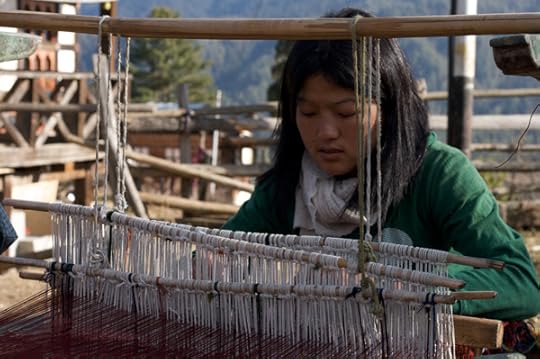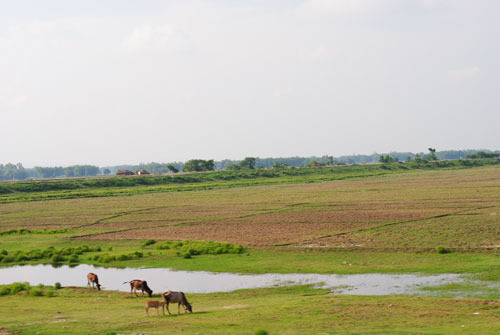Lisa Napoli's Blog, page 68
March 9, 2011
Quinn and company
Midwood friends: our old pal Michael Quinn got the last laugh on all of us; he married a fabulous, fabulous woman, lives in a beautiful house in gorgeous Denver, has two great kids (I want to kidnap their daughter), and is a part of an amazing, vibrant community here….. Take that, Brooklyn!








Gee what a surprise–people hate to commute
http://www.huffingtonpost.com/kirsten-dirksen/happiness-research-ranks-_b_829591.html
Happiness Research Ranks Commuting Low: One-Hour Commute Cuts Your Social Life By 10 Percent








Weaving in Bhutan
Want a laptop case made in Bhutan? Here's your chance…but to find out more
read about weaving in one particular village, first….








Gerard Brooker in Mensa Magazine about Bhutan
Historical novelist Gerard Brooker is reading RSL and just wrote with a story he composed after a visit there. Published in Mensa Magazine. Thanks for sending, Gerard!
"A Visit to Shangri-La"
As a pre-trip to a recent visit to Tibet and Nepal, I went to the Royal Kingdom of
Bhutan for a week. It is not without cause that this tiny country is referred to as the
mythic Shangri-La, a remote and inaccessible place, where happiness is more important
than materialism. Though it is not a country without problems, especially among the
Nepalese minority, I was drawn to Bhutan when I read about the "Happiness
Index" that informs its law-making process and way of living.
The only airport in the country is situated in Paro, a small city nestled in the
Himalayas. I had heard that some of the pilots flying into the airport encourage their
passengers with comforting words along the lines of, "You probably have never flown
this close to a mountain before. We do it every day. It is our skill. Do not be afraid."
I was glad I knew this beforehand, as the wings of our jet came very close, I guess
about twenty yards, to the mountain. I could see the landing strip as we wiggled
through the valleys. Just as I thought the worst was over, two smaller humps appeared in
front of us. We simply went up, down, up, and then finally down. Wheeee! It was like a
roller coaster ride.
And, Yes, there is a Happiness Index. My guide, Tenzing, explained that when a
new law is being discussed that their young king, the "Dragon King," the 5th in a
hereditary monarchy that began in 1907, goes about the country talking with
people in its remote parts about the law and how they think it might affect them. The
country is relatively small – about one and a half million people – in a space the size of
West Virginia. Most of the mountain roads are still unpaved and treacherous, one lane
for both directions. Sometimes, it seemed to me, the drivers were rolling the dice.
2.
Only 17,000 tourists visited the kingdom last year. It is difficult to get to, and the
government charges each tourist $300 U.S./day to visit. The fee includes room, board
and a guide, so it is not relatively bad. But it is a set and flat fee, no exceptions for the
less fixed. There is a running feud between the government and its tourist industry about
the regulated price. At the moment, the government is threatening to raise it by another
Maybe keeping strangers out is a way to allow the evident happiness to prevail. It
is common to see children in the younger grades holding hands and singing songs
while walking to school in the morning. Every student, from kindergarten to the end of
secondary school, wears a uniform, always clean and neat looking. The children smile a
lot in school. It is clear that they are respected and nurtured, and they did not lack
confidence while asking me many questions about America. When I was in one of the
elementary schools, a child of about six apparently hurt himself on the playground at
a time when I was talking with the principal. Several of the child's playmates came
running to the principal and showed such concern that I thought surely a tragedy had
occurred. It took only the reassuring hand of the principal on an invisible bump to
heal the boy and bring back smiles from his little pals.
I am aware that a few examples of care do not necessarily make a universe
of concern. Yet, when the examples are a part of the fabric, they are to be noted.
Each evening in the capital city of Thimphu, e.g., the news ends with a "Lost and Found"
announcement. I watched for it on the night when the news was about a lost wallet. "A
wallet belonging to Mr. (name announced) has been found. You can pick it up at
3.
(address)."
Another example: I spent a night in the tiny village of Phobjikha, celebrated in
Bhutan (which, by the way, has cable T.V.) because it turns on the electricity for a
few hours only each morning and evening. The reason? Its marshlands are a
migratory stop for the black-necked cranes, and the townspeople are afraid that the
electric current might harm the birds!
I was also taken by the graciousness of the many monks I met along the way.
They live in what are called dzongs, once full monasteries, now half shared with the
government for administrative functions. I had a fun experience in one where I was
allowed to enter a room filled with about forty teen-agers reading aloud together, a
common part of their schooling. When I went in, they stopped reading and many of them
began to run their fingers, first one hand, then the other, across their faces, while having a
good collective laugh. When I asked Tenzing what that was all about, he said, "They
think you look like a wrestler they watch on T.V."
In Gangtey I was allowed into one of their great old monasteries to see a
significant ritual honoring an iconic monk who had recently died. I was told that he was
the manifestation of the monk who had discovered the Buddhist "Relics" in the 7th
century. About four hundred monks of every age were kneeling and chanting, others
banging drums and cymbals, still more blowing horned instruments, while a few walked
about wafting incense. As I stood in the back watching the drama, an old monk took me
by the arm and led me through the chanting men to the front to view the bier. He then
took me behind the altar where a young monk gave me a red cord and a photo of the
4.
deceased. I was then led out. I learned that it would be a sign of respect to wear
the cord around my neck for three weeks.
One of the last places I saw in Bhutan before flying to Kathmandu was Tenzing's
home-town. I had a few hours to myself as he was visiting friends. I remember the
outdoor tailor asking me to look at his infected big toe, the woman who gave me a
piece of gum, the man who wanted his little daughter to say hi to the American, and the
old lady who asked me to try the chili peppers.
The little town is called Haa. At first I thought it was a joke, but then I
remembered that I was in the Royal Kingdom of Bhutan.
By Gerard Brooker








Tattered Cover
…is as amazing as everyone said, and more so. Now off to Tucson in the AM. Anyone up for the book festival there?
Ps My dad said the book is on the LA Times bestseller list! #14. I haven't verified.








AllSides With Ann Fischer
March 8, 2011
Great crowd at Boulder Books tonight
Another bit on the happiness angle
….on CNN.com Fun to be featured on the web companion of the place where I started my career many moons ago.








Boulder
If you happen to be in or near Boulder, I'll be at Boulder Bookstore tonight….so nice to be here in the sunny snow! with my dear old friend from the Internet days, Tery Spataro!








Nepali Bhutanese in Exile/Resources
(photo of region where refugee camps are located in Nepal/Kenan/Duke website)
Fascinating interview with expelled Bhutanese who protested at the Gross National Happiness USA conference in Vermont this summer. It's rare to hear refugees speak on tape, for they are very shy and worried about retribution. One factual correction: The supposition that the Bhutanese government arranged the gathering is off-base—as far as I know it was Linda and associates from the GNH USA movement up there (less about Bhutan, more about alternative measures of the economy and a focus on wellbeing rather than on unsustainable development) who spearheaded this conference. Thanks for the link, Adrie!
 ; shows footage from the camps and from inside Bhutan. Just uploaded to YouTube. Shows a reporter who masqueraded as a tourist to get into Bhutan to shoot video, as well as life in the camps, which were just several years old then.
; shows footage from the camps and from inside Bhutan. Just uploaded to YouTube. Shows a reporter who masqueraded as a tourist to get into Bhutan to shoot video, as well as life in the camps, which were just several years old then.
Interesting information on the  and read the essay The Arrogant Eye by Ben Elkind, who visited the camps.
and read the essay The Arrogant Eye by Ben Elkind, who visited the camps.






























